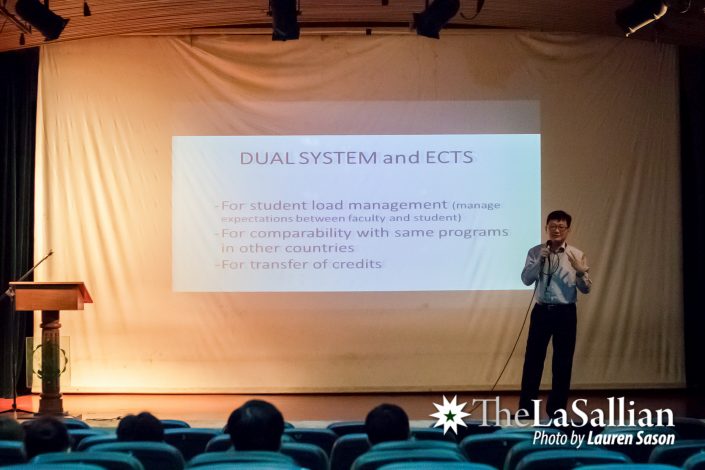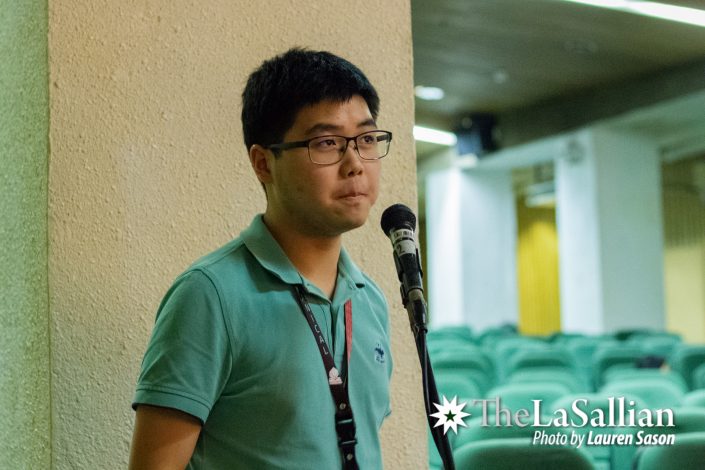“Are our students overworked?”
This was Vice Chancellor for Academics Dr. Robert Roleda’s question in a town hall meeting held last December 13 at the William Shaw Little Theater. On the agenda were addressing academic concerns from students, including the University’s minors program and U Break, and outlining new academic proposals—in particular, the adoption of the European Credit Transfer and Accumulation System (ECTS) to standardize DLSU’s academic crediting system to international benchmarks.

Up to standards
The ECTS is a standard tool used by European Union countries to help gauge the workload each student undergoes in an academic year. It also helps standardize the crediting of courses for students who transfer between schools internationally. In this system, 60 ECTS credits make up an entire academic year, roughly equivalent to 1,500 to 1,800 hours in total or 25 to 30 hours per unit of credit.
Roleda reasoned that the standardization of units in DLSU is necessary as the present crediting system of the University does not accurately measure how much workload students have to do at home.
“In the Philippines, we only have one unit equals one classroom hour, it doesn’t specify how much work is expected after class,” he explained.
In countries like the United States, each unit does not only correspond to the number of class hours per unit, but also the number of hours that would be spent on homework.
The current unit system, however, will be retained as the Commission on Higher Education utilizes the system for regulating tuition fees. The new ECTS system will be integrated into the old unit system by providing each course in the University with its ECTS conversion.

Roleda shared the initial proposals for unit standardization according to ECTS measures. For General Education courses, he mentioned one class hour and homework hour would be required for every unit and would correspond to one ECTS credit per unit. His other proposal for major subjects, which “typically requires more work,” will be set as one class hour and three homework hours that will equate to two ECTS credits per unit.
Application to La Salle
“Knowing the equivalent ECTS unit would be helpful for students to manage their load,” Roleda stated. With ECTS used as a basis for the unit system, the actual work hours required for students can be determined. But to assess these actual work hours, Roleda explained that the University’s faculty departments must first submit a diagnosis of their own curriculum.
With the ECTS being used by a majority of European countries, Roleda shared that students who go on exchange programs will be able to properly transfer credit from academic units that they took abroad. Since there is no standard equivalency between units used in the Philippines and ECTS, Roleda expressed his belief that introducing the ECTS would come in handy. “Having a course recognized abroad will become easier if we follow a European standard widely known around the world,” he said.
Although a similar system is used by the ASEAN University Network, dubbed the ASEAN Credit Transfer System (ACTS), the system has not yet arrived on a common standard.
Other concerns
Addressing speculations on whether the University’s minors program would become optional for students, Roleda stated that the minor courses is still required for ID 118 and 119 College of Liberal Arts students; however, Roleda divulged that whether or not this will be the case in the future is still up for discussion by the Academics Council.

Regarding the current U Break schedule, Roleda, who led the shift from Friday to Monday as University Chancellor in 2018, ascertained that as of now, there will be no changes for the U Break schedule. “To have another move is definitely not a good thing. Whatever system we have now, we have to let it go for another five years before we think about changing [it] again,” he said.
